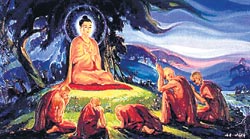By M.B. Werapitiya
Having practised the ten paramis (perfections) of generosity, morality, renunciation, wisdom, energy, patience, truthfulness, determination, loving-kindness and equanimity in their higher and highest proportions over millions of rebirths, the Buddha aspirant Prince Siddhartha was born for the last time, to launch on His final mission to break through the barrier of ignorance to see things in their true perspective. This required the development of His mind with insight meditation from which everything unfolds.
Insight is mental penetration which arises with the understanding that all phenomena are in a state of constant change from moment to moment and what is changing is unsatisfactory for the reason that in the case of man it brings about aging, disease, decay and death, and what is changing has no permanent self or entity.

Lord Buddha delivering His first sermon to the five ascetics
With such insight, the mind gets cleansed of its defilements of greed, hatred and delusion and is thus awakened.
In this process, rebirth – producing energy runs its course to a finish and rebirth which is the cause of man’s misery, grinds to a halt. Thus a fully awakened Buddha arises in this world to reveal the truth of sufferings, its cause, its ending and the Eightfold Path that leads to its ending.
What the Buddha experienced when vision arose, wisdom arose, intuition arose and light arose in Him seemed so profound, so difficult to perceive, and exalted not within the sphere of logic, that initially He was in a quandary not knowing how He was going to disseminate His knowledge amongst mankind.
Casting His all-seeing eye He saw as a blessing some human beings with less dust in their eyes fit to receive the fruits of his labour. He thus delivered His first sermon – “Setting the Wheel of Law in Motion” to the group of five ascetics who were His erstwhile companions in search of the facts of life, at Isipathana Deer Park. Kondanna who fully understood the substance of the discourse became a stream-winner and progressed to become an arahant i.e. one who ended the round of existence.
What did this discourse deal with? It dealt with the quintessence of the Buddha’s teaching – suffering, the cause of suffering, cessation of suffering and the Path leading to the cessation of suffering. To go into details – birth is suffering, disease is suffering, death is suffering, to be united with the unpleasant is suffering, to be separated from the pleasant is suffering, not to get what one desires is suffering. The cause of this suffering is craving for sensual pleasures, craving for existence and craving for non-existence. The Eightfold Path comprises right understanding, right thought, right speech, right action, right livelihood, right effort, right mindfulness and right concentration of mind.
A scientific theory is that nothing ever happens without a reason. Going on this principle one is here not by chance or accident but by one’s own making, one’s own will. One’s karmic energy together with one’s flow of consciousness from the past rebirths put one into shape to be what one is. In this context it will be relevant to know that for the formation of the embryo in the mother’s womb, re-linking consciousness of a dying person together with its entire history descends linking together with the new existence.
It thus follows that the new life must start from the consciousness of a past life. One will go on and on with each new rebirth lending the opportunity to improve oneself. One should not lose sight of the fact that being a part of the universe what one thinks and does intentionally, has a definite impact, positive or negative as the case may be on the world system making it respond accordingly. From this follows the Buddha’s statement - “He who treads the path of the dhamma (doctrine, truth) is protected by the dhamma.”
The prime question that arises is, “What are we here for?” The answer is to observe the five precepts – not to kill, not to take what is not one’s own, not to commit sins of the flesh, not to bear false witness, to shun alcoholic drinks and drugs that confuse the mind; spread freely among all living beings metta (loving kindness) and karuna (compassion) and awaken one’s mind with sila (mental discipline), samadhi (concentration) and panna (wisdom).
Following others blindly for the reason that one is not willing to develop one’s strengths to light up one’s way, does not get to one’s due place. Should one be worthy of being born into this world it necessarily follows that one is equally worthy of receiving nature’s bounty without let or hindrance, to one’s advantage.
The idea is to elevate one’s mind to think in terms of a winner. According to Buddhism truth has to be self-analysed, self-realized, self-experienced.
Faith must arise from the conviction that what we are made to believe or choose to believe should be weighed and considered and proven beyond a doubt. As much as the purpose of a seed is within the seed itself to grow into a tree, spread its branches, bear flowers and seed and disperse itself, the purpose of man is within man to work out his salvation with diligence. Salvation means cleansing the mind to let go of illusions and delusions that bind us to sansara (round of rebirths) for –
“……. There spring the healing streams,
Quenching all thirst! There bloom the immortal flowers
Carpeting all the way with joy! There throng
Swiftest and sweetest hours.”

No comments:
Post a Comment